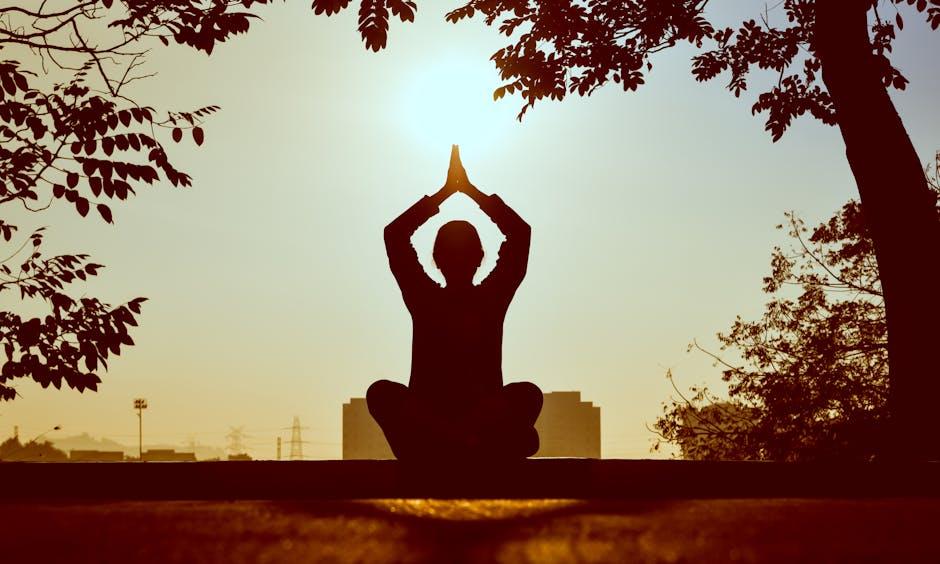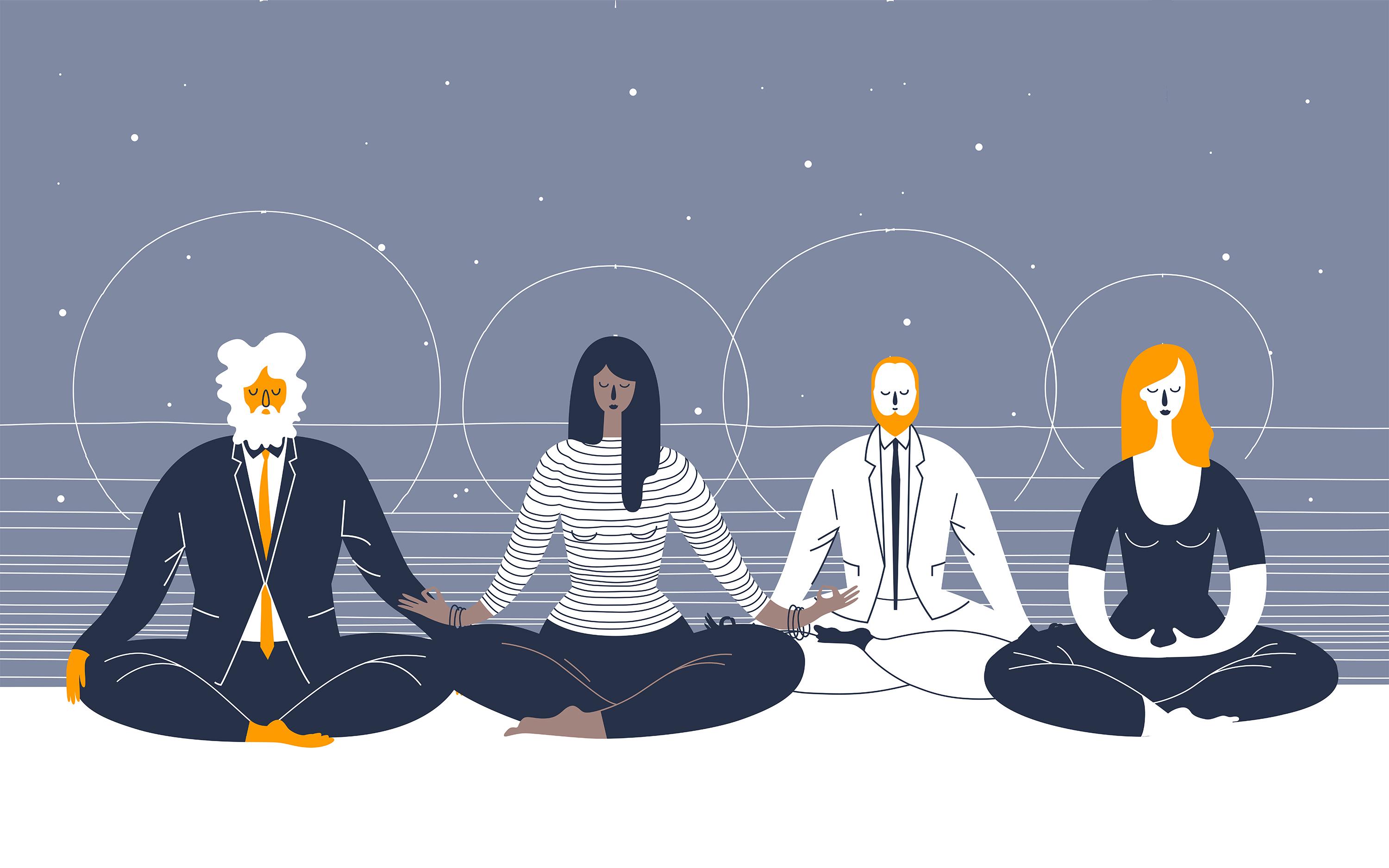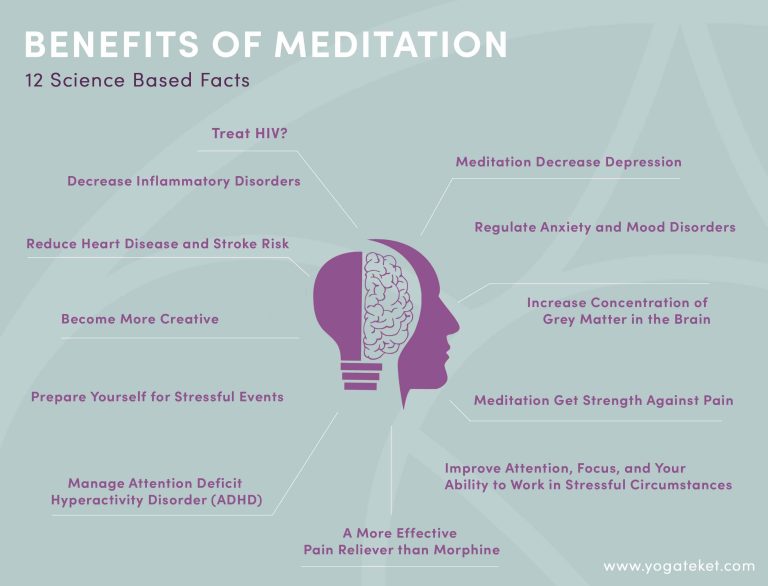In a world where stress has become the modern-day villain, meditation swoops in like a zen superhero armed with nothing more than a comfy cushion and some deep breathing. Welcome to the science of meditation, where ancient wisdom meets cutting-edge research in a blissful tête-à-tête. If you’ve ever thought sitting silently couldn’t possibly have more benefits than avoiding chit-chat at awkward gatherings, think again. Meditation is not only the cheat code to inner peace but also sports a laundry list of scientifically proven perks for both mind and body. Whether you’re a seasoned yogi or someone just trying to justify napping as a health practice, join us as we explore the downright delightful, and sometimes downright surprising, benefits of this age-old practice. Spoiler alert: Your brain and body may just thank you later!
Unlocking Zen Mode What Happens in the Brain When You Meditate
Ever sat down with a cup of tea, closed your eyes, and felt like your brain was in Zen Mode? Well, you might just be onto something! When we meditate, our brains undergo some fascinating changes. Time to unleash your inner neuroscience enthusiast—albeit with a splash of humor. First off, our prefrontal cortex, often dubbed the CEO of the brain, gets a well-deserved coffee break. This region is responsible for planning, problem-solving, and managing all those chaotic thoughts swirling around in your head. During meditation, this part winds down, leading to a quieter, more peaceful mind, kinda like taking a calming walk on a sunny day, but inside your head. So, while the prefrontal cortex kicks back and relaxes, the amygdala, our trusty alarm system for stress and anxiety, is basically saying, ”Calm your neurons, we’re in Zen Mode!”
But wait, there’s more! The brain’s network of neurons also switches from its usual fast-paced rhythm to a delightfully slower groove. This is the magic of the default mode network taking a backseat. Now, we’re talking about some internal Netflix and chill… only, it’s completely free and devoid of any cliffhangers. In the meantime, meditative monks could probably give world-class yogis a run for their money with their enhanced attention spans and mental flexibility. As they say, practice makes perfect, even if your meditation session is more “how many times can I think about lunch?” than “enlightenment achieved.” And let’s not forget, these changes might also lead to an increased production of the feel-good chemicals like serotonin and dopamine, turning us into wide-grinned champions of calm. Suddenly, those minutes spent meditating seem like a brain vacation, and who doesn’t want that?
| Brain Area | Effect During Meditation |
|---|---|
| Prefrontal Cortex | Relaxation and reduced activity |
| Amygdala | Decreased stress responses |
| Default Mode Network | Slower activity, promoting calm |

From Om to Oh Wow How Meditation Transforms Your Physical Health
Ever thought sitting cross-legged and humming could do wonders for your body? Well, brace yourselves because meditation is not just a spiritual journey—it’s a ticket to physical wellness too. Imagine instead of a yoga mat, you’re on a roller coaster where your heart, lungs, and immune system are all strapped in for an exhilarating ride. The thrill begins with the heart. Regular meditation has been shown to result in bonuses like enhanced blood circulation and lower blood pressure. No need for a punch card at the doctor’s office when you have meditative peace as your primary care provider. The laughs keep rolling in with the immune system, too. By helping to reduce stress, it amps up the immune response, transforming your body into the fortress it’s meant to be. Who knew that seeking enlightenment could double as your personalized healthcare plan?
But wait, there’s more! Meditation seems to have an exclusive, backstage pass to your lungs as well. Breathing exercises often associated with meditation can improve your lung capacity and boost oxygen intake. Suddenly, you might find yourself climbing those stairs and laughing at what used to be a daunting feat. It’s like your lungs have learned the art of stand-up comedy, only instead of cracking jokes, they’re supercharging your vitality. Here’s a breakdown of what meditation can do physically:
- Heart Health: Lowers blood pressure and improves circulation.
- Immune System: Increases your body’s defense abilities.
- Lungs: Increases oxygen intake and enhances lung capacity.
Now that we’ve exposed meditation’s undercover talent as a full-body health manager, it’s clear that embracing the “Om” can leave you saying “Oh wow!”

Mindfulness Masterclass Hilarious Yet Helpful Tips for Your Meditation Practice
Ever thought about why sitting silently on a couch could be a game-changer for your health? Believe it or not, meditation is like free therapy that your doctor might actually recommend. When you meditate, your brain gets a well-deserved break, which in scientific lingo means increased gray matter—the part of the brain responsible for decision-making and emotional regulation. In short, meditation can give you the brain power of a Jedi, minus the lightsaber. Feel stressed? Meditation can help lower cortisol levels, essentially flushing your stress hormones down the toilet of tranquility. Who knew sitting still could be so powerful?
Meditation can also work wonders for your physical health. Think of it as a mini tropical vacation for your body. It helps improve your immune function, making flu season feel less like a horror movie, and more like a mild comedy. Plus, if you’ve ever put things off until the last minute, meditation can enhance your attention span, turning every task list into a piece of cake. Check out just a few perks of regular meditation:
- Improved focus and concentration.
- Enhanced emotional health.
- Increased self-awareness.
- Reduced age-related memory loss.
| Benefit | Meditation Effect |
|---|---|
| Stress | Panda-level calmness |
| Sleep | Sleeping like a log |
| Anxiety | Butter’fly’ away anxiety |

Inner Peace Toolkit Essential Meditation Techniques for the Modern Busy Bee
Research has illuminated the myriad ways meditation positively impacts our minds and bodies. Think of it as a gym membership for your brain—but one where you can sweat in your pajamas without anyone noticing. Reduced stress is often the headline act, as meditation encourages a state of relaxation that sends your stress hormones packing. But wait, there’s more! You can also bask in the glory of improved emotional health. Regular meditation can increase your patience, making you less likely to transform into a grumpy gremlin when your coworker steals your lunch again.
Ever dream of becoming a productivity ninja? Meditation might just be the secret sauce. By enhancing focus and reducing distractions, it can help you leap mental hurdles like a superhero. For those maintaining a busy bee lifestyle, meditation polishes your concentration skills, ensuring thoughts of that pesky leaf blower outside don’t derail your train of thought. Other perks include:
- Enhanced self-awareness – Becoming more introspective without needing a mountain-top cave.
- Pain management – Providing natural relief, even for those pesky paper cuts.
- Better sleep – Because counting sheep is outdated.
| Benefit | What It Means for You |
|---|---|
| Mood Boost | No need for those pesky shrugs emoji 🫤 |
| Lower Blood Pressure | Feel less like a tomato, more like a cucumber |
Q&A
Q&A: Unlocking the Mysteries of Meditation with a Side of Laughter
Q: What is meditation, and why should I care?
A: Meditation is like hitting the “pause” button on your frantic life playlist. It’s a practice that involves focusing your mind, often on your breath, a mantra, or just trying not to think about that embarrassing thing you did in high school. Why care? Because your brain deserves a vacation from its own carnival, and meditation can provide that—without the sunburn or overpriced piña coladas.
Q: How does meditation affect the brain?
A: Think of meditation as a personal trainer for your brain. Regular practice can beef up your prefrontal cortex—the part responsible for decision-making and focus. It’s like giving your brain a premium gym membership. It also shrinks the amygdala, reducing stress responses. So, essentially, it turns your “Fight or Flight” button into “Netflix and Chill.”
Q: Are there any proven benefits to meditation?
A: Oh, absolutely! Scientists have been eagerly poking and prodding at meditators for years, and they found it’s like nature’s multivitamin. Benefits include reduced stress, improved focus, better emotional health, and increased kindness. Yes, kindness. So if you’ve been mistaken for a grumpy cat, this might just upgrade you to a golden retriever.
Q: How often do I need to meditate to see benefits?
A: The beauty of meditation is that it’s flexible like a yoga master. While more is generally better, studies suggest that even a few minutes a day can make a difference. So, start small—three minutes a day is a great starting line. Consider it your daily “mental flossing” routine.
Q: Can meditation really make me happier?
A: Short answer: Yes, unless you’ve just run out of chocolate—then all bets are off. Long answer: Meditation helps increase serotonin and endorphins, i.e., the brain’s happy chemicals. It’s like turning your mind into a hammock gently swaying in a tropical breeze, minus the mosquitoes.
Q: Do I need any special equipment to meditate?
A: If you own a brain, you’re already halfway there! Meditation is possibly the only activity where ‘just sitting there doing nothing’ is actually the entire point. A quiet space is helpful, but not mandatory. You can meditate in a chair, on the floor, or while pretending to listen to your boss on a video call. Just try not to snore.
Q: What’s a mantra and do I need one?
A: A mantra is like a mental focal point, sometimes a word or sound you repeat to yourself. It’s the meditative equivalent of your favorite karaoke song—just you and your inner peace singing in perfect harmony. But don’t stress about it; you can totally meditate without one. Your breath works just fine as your meditation ‘jam’.
Q: What if I fall asleep while meditating?
A: Congratulations! You’ve reached a state monks strive for: extreme relaxation (or you just need more sleep). Falling asleep might mean your body is telling you it’s nap time, and hey, accidental naps are the best naps. Just don’t take up park meditation—getting mistaken for a vagrant is not part of the meditation benefits package.
By incorporating a touch of humor, we hope this Q&A made the scientific wonders of meditation more approachable—and perhaps tickled your funny bone in the process!
Closing Remarks
As we wrap up our enlightening journey through the science of meditation, let’s take a moment to appreciate the irony: while this age-old practice is about clearing your mind, it’s mind-blowingly full of benefits. Seriously, who knew that sitting still and doing nothing could work so hard for us? Whether you’re in it to tranquilize your stress, turbocharge your creativity, or simply to find out what having a “monkey mind” really means (spoiler: it involves bananas), meditation has your back—and your brain, and your immune system. So, next time you find yourself entangled in the chaos of modern life, remember that sometimes the smartest thing your “monkey mind” can do is to hang out on a hammock of mindfulness. Sit back, relax, and let meditation do its thing—because who knew the secret to upgrading both mind and body would be the mental equivalent of a nap!


